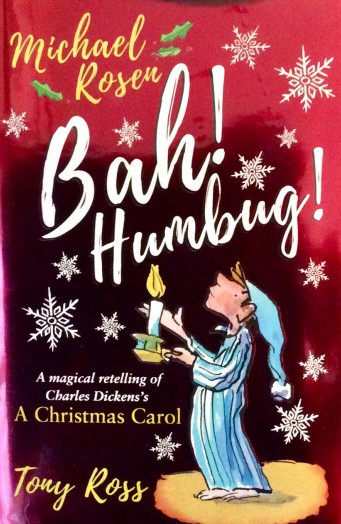Inspiring Young Readers
 posted on 20 Dec 2017
posted on 20 Dec 2017
Bah! Humbug! By Michael Rosen, illustrated by Tony Ross
If you are quick there is just about time to get this excellent children’s book in time for Christmas – which for quite a lot of people in and on the edges of poverty this year is going to feel more like they are living in 1848 (the original date of Dickens’ Christmas Carol) than in 2017. The author of Bah! Humbug!, Michael Rosen, has made this point very clearly in the publicity for his version of a classic story that was originally written to highlight the terrible social conditions of Victorian England.
‘A Christmas Carol’ is also famous because of the way in which the central character, Scrooge, undergoes a transformation from being a selfish, lonely miser to becoming a generous benefactor. This change is, of course, brought about by visitations from the Ghosts of Christmas Past, Present and Future and learning an awful lot about himself and others along the way. The enduring appeal of the original is that it is an engagingly well written story with strong memorable characters and a compelling plot.
Because of this, there have been many book, film, TV and dramatic versions of the original story and the underpinning messages are now undisputedly part of western culture. So it’s always a real test of an author’s skill to be able to revisit such a classic tale and bring something fresh to it. So how has Michael Rosen done?
I’d say he’s been pretty successful on the whole because he’s rather cleverly been able to retain the core of the original by choosing to retell it in the form of a school’s drama production. This allows him to keep in place the key elements and structure of the original tale.
In this new version, young Harry Gruber is cast as Scrooge and he is extremely nervous, even though he has practised and knows his lines perfectly. Part of the story is set before, during and after the school performance and so we learn quite a lot about his good humoured mum, Lisa and his older sister, Eva who is also always very supportive and encouraging. But the main focus is on his dad Ray, a man who has lost sight of how to have a work life balance and is constantly chasing work deadlines at the expense of relaxing and enjoying life. There is an underlying tension between him and Lisa and the two children are also very keen to please this short tempered and sometimes sarcastic man. Family life has its ups and downs and this is not an unhappy or particularly dysfunctional family, but one that I think many children might recognise. I certainly remember low level bickering and teasing as being part of everyday family life and a slight anxiety if the temperature rises and parents reveal their shortcomings, because after all, no parent is perfect
Despite his anxiety, Harry is fired up with enthusiasm about starring in the show and this story is an excellent way to introduce children to the joys of working together to make something special. This is all helped by Miss Cavani, a great example of an inspirational teacher who is full of praise for all the cast. At last the show begins, the audience is rapt and all is going along beautifully until Ray gets an urgent call on his mobile phone:
‘I’ve got to go in. This is big. Mumbai.’

The deft illustrations drawn by Tony Ross are an essential part of the story and this is one of the many instances where pictures speak volumes as we see the look of pure disdain on Lisa’s face as she looks at her husband.
Ray leaves the show so that he can make the most of the business opportunity and so begins his transformational journey. When he arrives at work he meets his own ghosts of Christmas Past, Present and Future and has cause to reflect on how he is going to continue to live his life. He talks with his work colleague, Francois about when he first realised that his own parents didn’t have much money and then remembers about when his marriage with Lisa was on the rocks but recovered. As the long night goes on and he is driving home from work to find his left behind laptop, he remembers how his own childhood had been defined by poverty and joylessness, all of which had shaped him into a man who wanted a good life for his own family. Once he also cared about changing the world for everyone, but more recently he has been focussed on making money for himself and his family. When did all this change and why did he let it happen?
As with the original, this is an endearing multi- layered tale about mortality, compassion, community and joi de vivre, no matter what the circumstances. I’m not going to spoil the ending of the story other than to reassure you that Ray sees sense at long last and as he drives frantically back to the school to catch the end of the performance he smiles as he plays a rather apt CD: ‘ A Change Is Gonna Come’ by Sam Cooke. Perfect.
Karen Argent
December 2017